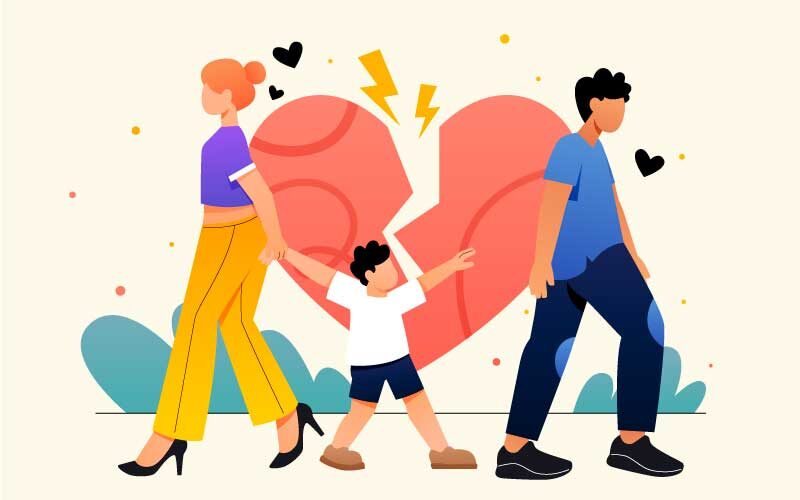When a marriage begins to crumble, certain parents find themselves pondering whether they should remain together for the sake of their children. On the other hand, certain parents reach the decision that divorce is their only practical choice. Parents struggle with a variety of issues during this stressful process, from the future of their living arrangements to the ambiguity surrounding custody arrangements. However, their main concern is frequently how the divorce would affect their children’s lives. Children who have undergone divorce may face a wide range of psychological repercussions. All children experience stress as a result of divorce, but some are quicker to bounce back and adjust than others. The good news is that by using supportive parenting techniques, parents may lessen the psychological toll that divorce has on their kids. Parents may significantly help their children navigate and adjust to the changes brought on by divorce by putting in place a few practical steps (Morin, 2022).
Behavior problems that may arise from divorce
Divorce can have a significant impact on children, often leading to the development of behavioral problems. Many parents may let their kids act out without consequences in an effort to make up for the absence of the other parent, which results in a lack of discipline. Additionally, a variety of emotions that youngsters feel, such as anxiety, grief, uncertainty, and frustration, can have a significant impact on their conduct. Young children may find it difficult to comprehend diverse points of view when both parents divorce since their brains are not yet completely matured for this kind of reasoning. As a result, they might only see things from their own perspective, which leads to unpredictable behavior. Children from separated homes may also start acting out their feelings, which can result in behavioral problems, destructive behavior, and irrational behavior. Additionally, these kids are more likely to get into fights away from home (Fiona, 2022).
Effects of divorce age by age
- Birth to 18 months
Although it may come as a surprise, divorce does have an effect on children. Even at such a young age, babies can sense the strain within their household and between their parents, yet they lack the ability to comprehend the reasons behind the conflicts. If this tension persists, babies might display increased fussiness and clinginess, particularly in the presence of unfamiliar individuals, and exhibit frequent emotional outbursts. They may also experience regression or display signs of delayed development (Broadwell, 2005).
- 3 to 6 years old
Children between the ages of 3 and 6 find it challenging to grasp the concept of divorce, primarily due to the overwhelming sense of fear and unpredictability it entails. Regardless of the conflict in the house, preschool-aged children lack a cognitive grasp of divorce and vehemently oppose the concept of their parents divorcing. Preschoolers may incorrectly believe that they are to blame for their parents’ choice to split up, much like toddlers do. They could feel conflicted about the future, hold in their rage, have unsettling thoughts or ideas, or struggle with nightmares (Broadwell, 2005).
- 6 to 11 years old
School-age children between 6 and 11 years old often grapple with feelings of abandonment following a divorce. Specifically, younger children aged 5 to 8 may struggle to comprehend the concept and perceive the divorce as a personal rejection. They could be fearful of losing one of their parents and indulge in wishful thinking in the hope that their parents would reconcile. They can even think they have the ability to “save” their parents’ union. However, kids between the ages of 8 and 11 may place the responsibility on one parent and side with the “good” parent while opposing the “bad” one. These feelings can appear in numerous ways, such as fighting with classmates, demonstrating animosity towards the world, or displaying signs of anxiety, withdrawal, or despair. They may vent their anger by accusing their parents of being cruel or self-centered. Some children may even experience physical manifestations of the divorce’s impact, such as stomachaches or headaches caused by stress, as well as fabricating symptoms to avoid attending school (Broadwell, 2005).
How to support children through a divorce
Every child responds to divorce in their own unique way, but they all require consistent care, space to process their emotions, and validation. Setting aside certain times to talk with your kid about the divorce, their experience, and their feelings might be beneficial. If they are unwilling or unable to discuss these issues, it is nonetheless crucial to respect their boundaries. It’s important to acknowledge their perspective when they do speak up and affirm their feelings by saying things like “It’s understandable that you…” or “I can imagine you might be feeling…” It’s important to be careful about how much information you tell your child about the divorce and how you feel about your ex-spouse personally. Your kid won’t have to bear the burden of the divorce if you take care of your own mental health by using self-compassion, asking for help from others, or going to therapy. Remember that children can benefit from divorce if they receive the right support. For example, they can live in a healthier environment, see their parents happier, spend more time with each parent, and learn that even though change can be challenging, it is possible to get through it successfully (Schwartz, 2022).
Reference
Broadwell, L. (2005). Age-by-Age Guide to What Children Understand About Divorce. [online] Parents. Available at: https://www.parents.com/parenting/divorce/coping/age-by-age-guide-to-what-children-understand-about-divorce/ [Accessed 24 May 2023]
Fiona (2022). The Effects of Divorce on Children. [online] The Wave Clinic. Available at: https://thewaveclinic.com/blog/the-effects-of-divorce-on-children/ [Accessed 24 May 2023]
Morin, A. (2022). The Psychological Effects of Divorce on Children. [online] Verywell Family. Available at: https://www.verywellfamily.com/psychological-effects-of-divorce-on-kids-4140170 [Accessed 23 May 2023]
Schwartz, B. (2022). The Effects of Divorce on Children & How to Help them Cope. [online] Choosing Therapy. Available at: https://www.choosingtherapy.com/divorce-and-children/ [Accessed 24 May 2023]
